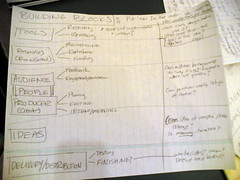I participated in a session called Iterative Media: treating your media as code. The gist was how can collaboraiton and constructive, group creation be applied to more traditional media output. Thanks to Josh Kinberg and Dee Harvey for taking awesome notes! Read on for the notes we took from the session.
TITLE OF SESSION: Iterative Media
NUMBER OF SESSION: _number_of_the_session_here_
MODERATED BY: Kenyatta Cheese, Ryan Shaw
CONFERENCE: Beyond Broadcast
DATE: May 13, 2006
LOCATION: Harvard Law School, Austin North
-------------------------------------------------------------------------------
REAL-TIME NOTES:
{If you've contributed, add your name, e-mail & URL at the bottom}
Treating Your Content Like Code
Can we create a world where content is commonly created like software -- with roadmaps, feature feedback, and versioning? We see parts of this emerging in officially sanctioned fansub contests and open source documentary projects. What processes, platforms, and policies need to be in place to enable a world of Iterative Media?
INTRODUCTION
Reasons to treat media like code:
problems with copyright
why these are important developments:
former archetype for software: Microsoft word
hierarchichal, blueprint-based
modern: flickr (iterative development): originally on online game with chat room where pictures could be sent to one another; no resemblance to current iteration. changed rapidly in response to how people used it (sometimes as much as 10 times daily on the live site).
permanent beta
idea: media that looks different to different people, even when viewed at the same time.
WHAT IS ITERATIVE MEDIA?
feedback loops. moderator implements feedback, vs, derivative works, group contributions/modifications (multi-user).
Theory and Models
(from Jon Garfunkel)
narrative model vs. normative model (e.g. blog vs. wiki)
blog (narrative) is something you write and move on
wiki (normative) is always about continually improving the same document
legal code is normative
plenty of stuff in the middle between narrative and normative
Josh's Note: Blog is a timeline. Wiki is version-based timeline?? Different ideas of process...
--
Changing thoughts of media away from media as an object, but as a theme, and with metadeta.
World-like growth of documentary space depends on metadata and linking.
--
Kent Bye: how do you make it easy to have many people collaborate on this kind of project?
suggestion: less a wiki model than a del.icio.us model
human filtering aspect of the collaboration.
rights: as a producer it doesn't make sense to give up all rights to your material (where is the revenue for contributors in collaborative model? Is revenue needed?)
one solution: creating the traditional product as well as the collaborative version
--
Mapping out our processes: something we should be doing to see how to achieve results in this kind of work
Example: http://echochamberproject.com/collaborativefilmmaking
Media is an experience. allowing content to be repurposed to extend the experience beyond the original work.
Q: Why allow derivative works?
A: Enables participation/experience/engagement with media
Enable Direct Interaction.
Modeling / Examples:
Examples enhance participatory activity
Peer (to peer) mentoring: possible model
Rebecca McKinnon: "[journalism is] bringing the right people to the right table at the right time"
suggestion by participant: we are now trying to make the table
see references below for books on models
Intentionality -- allows contributors to be on the same page, if intentionality is shared (unlike wikipedia edit wars, general vandalism)
User perspective: what's in it for them? social capital feedback?
attribution. whuffie. give users the thumbs-up to encourage their (continued) participation
What about people who take people's work and don't attribute?
Keep an edit trail / revision
How does it feel to give up control, as a media creator?
(there are different kinds of control)
We can record media without necessarily knowing what we are going to do with it and leave it open to see what people do with it.
Dee's note: what are the implications of pre-emptive recording? what does that imply for memory and culture? how do we decide what we will wish we had recorded in 50 years?
Kenyatta: Iterative media does not have to be open source.
Iteration takes place before you have an artefact, before there is a finished product
What is the relationship between the finished piece and the open source iterative process?
Radio stations (and other media outlets) now have "more" time for content, so it is easier to get your work on their site/on the air. there is more money for such projects, but the ownership issues are still in dispute. in many cases they want ownership of any projects they fund.
dee's note: what is happening to time? what implications are there for time (and maybe attention) as things develop in this way?
Kent: submitters & committers
core committers - have invested a lot of time and are at the top of the community
submitters - less involved - tagging, comment etc.
josh d note: how to encourage even more submitters -- because there are also just passive viewers. and how to create work that demands active 'submitters'?
PLAN FOR AFTERNOON:
List of workflows and best practises
Licensing and control
Mapping out the space in terms of the narrative-normative spectrum
(come back for more after lunch!)
*** pause ***
Q&A / DISCUSSION
-------------------------------------------------------------------------------
REFERENCES: {as documents / sites are referenced add them below}
civilities.net ? "constructive media"
http://kenyattacheese.net | kenyatta's site
http://unmediated.org | group blog
http://echochamberproject.com/ | Kent bye's echo chamber project
http://echochamberproject.com/collaborativefilmmaking | kent's collaboration map
_The Social Life of Information_ & _The Social Life of Documents _ John Sely Brown
http://okayplayer.com | social online network used to produce media
http://msmdx.net
Garage Cinema Publications
_Code_ by Lawrence Lessig

